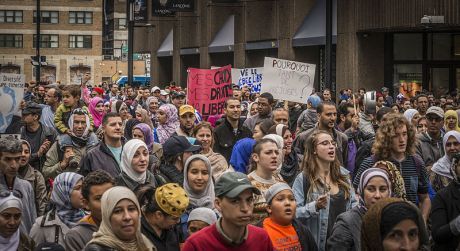News
You are here
Quebec LGBTQ activists on the Quebec “secularism” Charter

February 3, 2014
Quebec’s Bill 60, at first known as the “Charter of Values” and now as “A Charter affirming the values of secularism and of the religious neutrality of the state as well as equality between women and men and including accommodation,” has pitted different minority and oppressed groups against each other: religious minorities, women, and LGBTQ communities.
The incorporation of the notion of “equality between women and men” into the very name of the Charter indicates the extent to which the demonization of religious accommodation relies on creating a narrative about women’s liberation that pits women against religious minorities. It is the same narrative that dominated the debate about religious accommodation at York University recently.
“LGBTQ for an inclusive Quebec,” a grouping of Quebec activists and campaigners for LGBTQ rights and for feminism, identifies this narrative as false. They give the lie to the idea that religious accommodation must be counterposed to liberation for women or for the queer community.
The group wrote a brief for the public hearings currently being held on the Charter by a Commission of Quebec’s National Assembly. The brief states: “We want to add our voices to the debate on the Charter because we believe that certain people have claimed to represent the entirely of our community, while our relationship with religions is much more complex than the wholesale adoption of a closed secularism as presented by the PQ government.”
This could be equally said about some feminists who have claimed to speak on behalf of the entire women’s movement in Quebec. In reality, the feminist community is mixed and divided on the specificities of the Charter, and not only along linguistic or ethnic lines. Despite a variety of views on religion and secularism, some Quebec feminists are united in viewing the Charter as a crass attempt to scapegoat other religious minorities to divert attention from the PQ government’s neoliberal policies and cuts, and to cynically boost their chances in a spring election.
The “LGBTQ for an inclusive Quebec” brief is both a refutation of the specifics of Bill 60 and a refusal to be used as a political tool in the current debate surrounding it. It denounces the attempt to reduce any single religion to being an enemy of LGBTQ communities without taking into account the complexity of developments within religions, as well as the relationships of members of LGBTQ communities who have grown up within those religions. It asserts that Bill 60 does nothing to counter religious fundamentalism and intolerance, and instead turns “secularism” into a new civil religion.
And importantly, the brief identifies the real target of the Charter: “We note that a debate that should have been about secularism, reasonable accommodation and integration has become above all a debate about the veil, an article of clothing and religious observance of our Muslim sisters. This shift leads us to understand that it is not really a question of the neutrality of the state. We are asked to see in the wearing of the veil in Quebec a symbol of the abuses committed against women in the entirely of the Muslim world.”
The brief rejects this view, and speaks eloquently about the need to assure the integration of all new immigrants, including women and LGBQT immigrants, whereas Bill 60 does precisely the opposite.
The brief ends by drawing common cause between the treatment of LGBTQ communities and that of all minority groups:
“For too long, we have been the victims of insults, violence both psychological and physical, even murder, for the sole fact that we have a way of existing that does not fit with the “norm” dictated in the name of the majority. We cannot but deplore that today the citizens of Quebec believe themselves to have the authority to attack Muslim women for the sole reason that they publicly express their religion.
For us it obvious that a more egalitarian society is based on solidarity between marginalized people, which is why, as “minorities,” we want individuals who compose our society to fully enjoy freedom of expression, as it is currently stated in the Quebec Charter of rights and freedoms.
Finally, we ask that the National Assembly of Quebec not adopt in haste a bill that will not facilitate the integration of new immigrants, that will make the economic integration of some women even more difficult, and that will not advance the rights of the members of our communities.”
Section:










